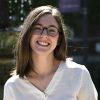Eboo Patel made it clear that he believes that Goshen College has the potential to become a thriving interfaith community during his visit to the campus on Oct. 26 and 27.
During his 24-hour visit, Patel, founder and president of the Interfaith Youth Core and author of “Acts of Faith,” visited with students, engaged with classes, roamed the campus and gave to formal speeches.On Thursday evening Patel presented a Yoder Public Affairs Lecture titled, “Interfaith Leadership: Engaging Faith and Philosophical Diversity in the 21st Century” in the Goshen College church-chapel at 7:30 p.m. The sanctuary was filled to capacity, with both the lower level and balcony completely full of students, faculty and staff, and community members.
Patel began his speech by describing Concordia College in Moorhead, Minn. Patel described the college as being an institution that focuses especially on honoring its past, but also connecting it to the future.
“This is the kind of conversation colleges have all the time,” Patel said. “In fact, it’s one of the conversations taking place here at Goshen College. How do we honor our Mennonite identity and heritage and connect it with the reality of our college’s present, the world that we currently live in, and the future that our graduates are not only going into, but are also going to build?”
With three points, Patel explained how Goshen College can work to become an institution grounded in its heritage, while also preparing for its future.
The first point Patel made was the importance of a college’s identity. To explain his point, he told a personal story about his father’s acceptance into the University of Notre Dame’s Masters of Business Administration program.
While his father wasn’t an overachieving student, he brought diversity and a different perspective, something the university, as a Catholic-affiliated institution, valued.
“It seems to me that narratives like that,” Patel said, “which connect the particularities of a college’s identity, the distinctiveness of a college’s past, with the realities of the diversity of the present and the preparation for a world that is only going to become more diverse is absolutely key.”
Patel’s second point began with the question: “What does it mean to be a Christian college that is religiously diverse?”
“What does it mean to hold fast to one’s own tradition, while also admiring the faith commitments of the people around you?” Patel asked.
From there, Patel told another story about his father on the Notre Dame campus. Patel recalled visiting the university with his father and brother for football games. Prior to the games, Patel’s father would visit the Grotto, a Catholic shrine dedicated to the Virgin Mary.
His father, “the least ritualistic Muslim you’ve ever met in your life,” would close his eyes, cup his hands, rock back and forth and whisper Arabic prayers.
His father’s actions confused Patel. As Muslims, his family didn’t believe in statues and shrines, and especially not those of the Catholic faith. Patel questioned his father, who responded: “Whenever you encounter something different – a different community, a different person, a different religion – you can choose to widen the differences, or you can choose to look for the resonances. If I were you, I’d look for the resonances.”
Patel then asked: “Could it be that a religiously diverse community is actually an opportunity for deeper religious commitment in addition to the possibility of interfaith relationships?”
The final point of Patel’s speech was the importance of interfaith literacy in communities, such as the Goshen College community. To emphasize his point, he told a story about his son.
During the school day, his son ate pork. However, in the Muslim faith, pork is considered a forbidden food. Because of this, Patel’s son became distraught. Fortunately, his teacher was compassionate enough to understand why he was so upset and comforted him.
Patel used the story as an example of a literate interfaith community. However, he questioned what would have happened if his son’s teacher wasn’t so understanding. What if she hadn’t been prepared to face a situation like that?
Patel challenged the audience: “You want to ask yourself: How would I shape this conversation so everyone gets to be who they are and, as much as possible, peoples’ feelings don’t get hurt.”
Patel ended his speech by encouraging the audience to prepare themselves for the interfaith and intercultural community that is growing at Goshen College, and within the broader community as well. He urged them not to wait, but instead take the initiative and begin honoring their past, and preparing for the future.
“Will you have the vision, the knowledge base, and the skill set to nurture interfaith cooperation?” Patel asked.


